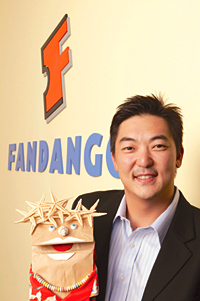| |
 |
| |
Ted
Hong '97 and a marketing colleague |
| |
|
Alumni
Profile: Ted Hong '97
Marketing
success is in the bag
Fandango
executive says a straightforward ad campaign that delights
audiences is the ticket to successful marketing in a cluttered
environment
By
Romi Herron
Ted
Hong '97 values the advertising impact that highly recognizable
brand spokespersons make — including the animated, or
even hand-fabricated, power player.
Hong
should know. As the vice president of marketing for Fandango,
an online entertainment ticketing and information venture,
the Kellogg School alum says the Los Angeles-based company
owes its success largely to the refreshing simplicity of its
Bag Puppet characters, scene-stealing entertainers and the
central promotional figures in Fandango's in-theatre advertising
push. They've been around since 2003, three years after the
company's inception.
"We
are tremendously proud of the recognition that the Bag Puppets
bring to Fandango in an increasingly cluttered advertising
environment," says Hong. "The creative director
of the spots, Len Fink, created the Coca-Cola Polar Bears
and he understands the need to entertain movie audiences before
you can earn the right to communicate your message to them."
Unlikely
silver-screen stars, the puppets have evolved into dozens
of festive "personalities" that have entertained
audiences for years in Fandango's commercials. The paper performers
reinforce Fandango's brand as "a representation of fun
and entertainment," explains the VP, who worked with
"The Simpsons" cartoon characters while a brand
management executive at Nestl�.
Hong
became familiar with audiences hungry for out-of-home entertainment
during a marketing stint with the National Basketball Association,
his first job after graduating with a bachelor's degree in
political science and economics from the University of California
at Berkeley.
It
was a brand-challenged Fandango that welcomed Hong when he
arrived three and a half years ago, he recalls. Fresh from
leading international marketing efforts for .TV, an Internet
infrastructure company, Hong possessed a sophisticated understanding
of the consumer, technology and entertainment intersection,
and with that knowledge he set out to revitalize Fandango's
marketing strategy.
"Since
we did not have the words 'movie' or 'tickets' in our name,
like our competitors, we had to explain to consumers exactly
what we did and [persuade them] to recognize our service as
the most convenient way to go to the movies," he notes.
Acknowledging
that in 2000, most Internet-based ventures faced "a pretty
big risk," Hong says that Fandango's exclusivity agreements
with four out of the five largest U.S. theater chains gave
them a fairly insulated position.
Fandango
performs extensive market research to understand its audience
and build its product to meet their needs, Hong says. He believes
that his Kellogg School studies prepared him well for this
role by building his marketing and general management foundation.
"Fandango
sells tickets to more than 14,000 screens and continues to
gain traction. We are the one place on the Web where consumers
can get all their movie information, including trailers and
reviews, as well as that last important step of actually buying
a ticket," Hong says. "We had our best month ever
in July, when Nielsen/Net Ratings showed a 50 percent increase
in unique visitors over the same period a year ago."
Now,
Fandango is primed to expand into other entertainment ticketing
because the company is not limited by a movie-centric name.
That
realization underscores to Hong that business challenges can
lead to unanticipated opportunities.
"You
just have to be persistent and work hard to get that messaging
out there," Hong says. With 80 percent of the United
States population living within 20 miles of a Fandango-partnered
theater, and fan mail for the puppets flooding the company,
the Fandango characters are taking on a life of their own.
"Fandango
has been integrated into 'Saturday Night Live,' 'The Late
Show with David Letterman' and 'The MTV Movie Awards,' all
unsolicited," says the Kellogg grad.
But
despite the popularity of the flap-mouthed, button-eyed stars,
Hong is carefully pulling the strings to ensure Fandango delivers
what audiences want.
"The
Bag Puppets bring people to Fandango, but we also have a great
product that is tailored to fans of movies and delivers a
home run," he says. "There's no magic to what we
do, just lots of diligence and good consumer insight coupled
with solid execution."
|





